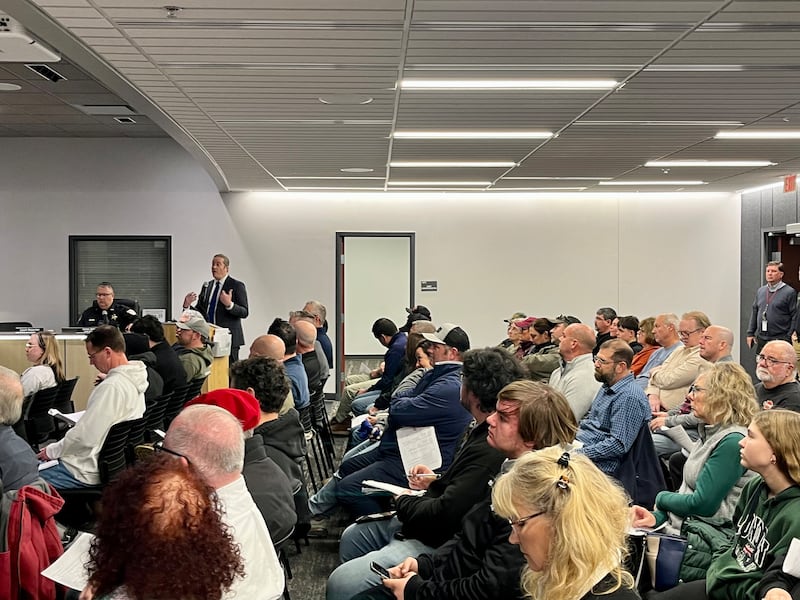The developer’s first attempt to gain a vote of approval for the 1,037-acre Project Cardinal data center in Yorkville did not go according to plan in October.
The measure was tabled by the City Council on Oct. 28.
Things went more favorably for the data center developers on the second attempt.
In what one resident said “will change the community forever,” the Yorkville City Council unanimously passed on Nov. 10 the project’s planned unit development – officially green-lighting the “larger than Central Park in New York” data center campus.
The campus is expected to included 14 two-story warehouses.
No aldermen publicly voiced any hesitations of the project throughout the planning discussions.
Several residents at the Nov. 10 meeting said the City Council will be accountable to the voters, but neither the mayor nor any alderman faced a contested race last election.
:quality(70)/cloudfront-us-east-1.images.arcpublishing.com/shawmedia/AJKPOIR7DVALXEZMOX55ZWAXEA.png)
City Hall was packed with overflow seating in adjacent rooms and set up in the downstairs lobby. Several trade workers, including with the local IBEW union, took up the front seats to voice their support for the project.
Several residents took umbrage, saying the union members were just there for the project’s money and wanted to drown out the residents’ concerns.
“People who will profit and who don’t live in Yorkville are supporting this. This only shows you who will benefit from this,” resident Richard Toporowski said.
City touts tax benefits
Tax revenues generated by the data center will be a game changer for the community, City administrator Bart Olson said.
At full build-out, the development is projected to generate between $35 million and $70 million in property taxes annually for Yorkville School District 115.
In addition, each individual warehouse will generate between $1.4 million to $2.9 million in utility taxes. This translates to $20 million to $40 million at full build-out.
Olson said the buildings will help increase the area’s equalized assessed value, helping to lower property bills. He said in DeKalb, the 227-acre META data center generates $31 million in property taxes annually.
This helped lower their residents’ property taxes in two of the last three years. DeKalb did raise property taxes this year, Olson said.
The Yorkville development must follow city sound pollution ordinances, although a study did not evaluate construction noise. The city will monitor light pollution. Generators will only be tested during the daytime to reduce noise at night, Olson said.
With the extra money, Olson said the city could reduce everything from garbage service fees, sales tax, road infrastructure fees, water rates, sewer maintenance fees or even create a downtown riverwalk.
Matt McCarron of Pioneer Development said “Project Cardinal represents a significant long-term investment in Yorkville’s future, and we look forward to working closely with the mayor and city staff as we move into the next phase.”
Alderman Arden Joe Plocher, the only alderman to comment before the vote on Yorkville’s largest-ever industrial project, said the city has long-envisioned manufacturing along the length of the Eldamain Corridor. He said data centers are the least invasive of all the manufacturing options.
This could cause worries to any residents currently living along Yorkville’s “data center alley.”
:quality(70)/cloudfront-us-east-1.images.arcpublishing.com/shawmedia/FO2XBNK6TFAXBPZUVEKXBOA4GQ.png)
Resident John Bryan, whose lawsuit against the city to stop the project is back in court on Thursday, Nov. 13 for a status hearing, said it’s ridiculous to say his property values will increase while living next to a data center.
“You are going to change the look and feel of Yorkville forever,” Bryan said. “The PUD is for 20 years. You are not going to have to deal with this, your children and grandchildren are.”
Another neighboring resident, Dorothy Flisk, who has started a change.org petition against Project Cardinal with 1,133 current signatures, said her family’s slice of “heaven” is being lost.
“I do not want to raise my daughter across the street from a data center,” Flisk said. “This will change the community forever.”
Project timeline
The project’s construction will be completed in phases, with developers saying all buildings will be completed in under 10 years. Previous meetings indicated construction may take 10 to 20 years.
Significant public opposition regarding sound and light pollution, potential health concerns, construction, water usage concerns, diminished property values and the negative aesthetics of warehouses on former farmland were taken into consideration in developing setbacks and where to start construction.
“We wanted to keep construction away from the most amount of residents as possible,” Olson said. “You have residents on all sides. There’s a couple farm fields to the north and farmhouses to the south. There’s a subdivision to the west and Bristol Bay [subdivision] to the east.”
Construction is anticipated to start in the northeast section of the property working toward Illinois Route 47.
The warehouses will have a 625 foot setback from Bristol Bay and 1,200 feet from Equestrian Estates. The buildings are limited to a height of 78 feet, including rooftop equipment, according to the approved plans.
The plan includes 4,900 new trees to be planted on the site, with a landscaped 12-foot berm placed near residential properties, with the berm becoming eight-foot along the rest of the site.
:quality(70)/cloudfront-us-east-1.images.arcpublishing.com/shawmedia/QGPZVW3JRJBRBBIXKE4FH3YRDA.jpg)

:quality(70)/s3.amazonaws.com/arc-authors/shawmedia/0cef0bf9-a04e-4bb4-aea0-03d8ced01c00.jpg)